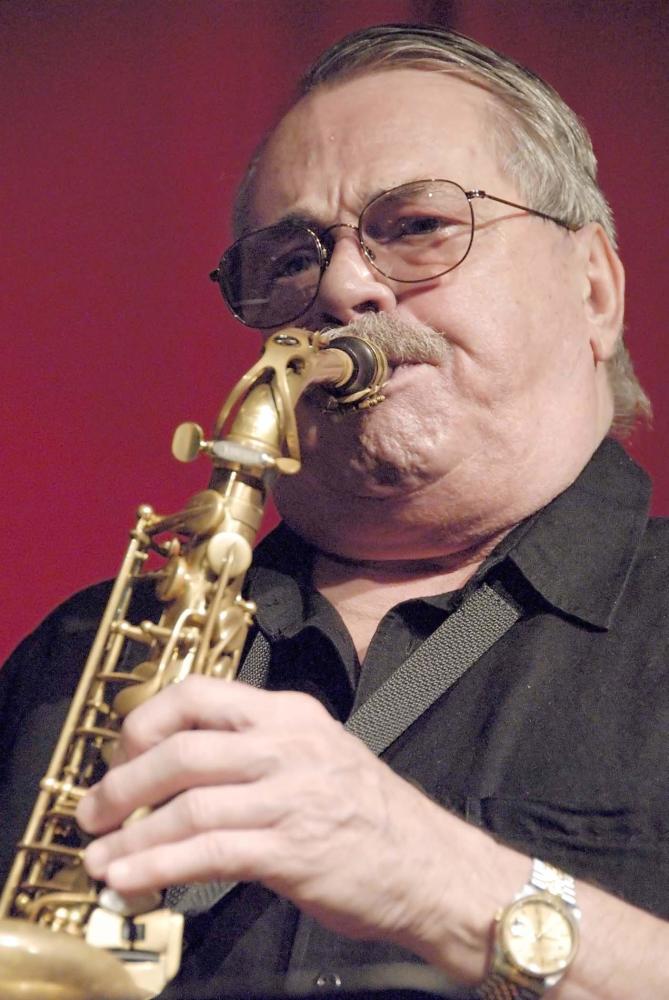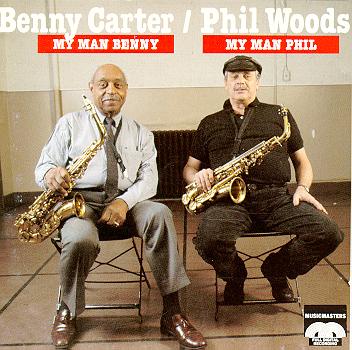
Word has arrived of the passing of Phil Woods. The great saxophonist wrote earlier this year that “my improv powers are declining along with my breathing,” and he announced that a concert he played a few weeks ago in Pittsburgh would be his last. Alas, he died today at the age of 83. Woods was a true giant of jazz, a beloved figure among his peers, and an inspiration to three generations of aspiring players. He was a tireless advocate for the music, but was a no-nonsense realist about the jazz life and the huge challenges faced by anyone seeking a career as a musician. For Phil, jazz was a profession for those with “No choice. You gotta have the fire in the belly.”
Phil was feted by Springfield Mayor Dominic Sarno at last summer’s Jazz & Roots Festival, where Woods appeared as the guest soloist with Greg Caputo’s big band. By proclamation, August 9, 2014 was Phil Woods Day in Springfield. I had the pleasure of introducing Phil that day, and visiting with him before his set. He seemed especially impressed that I’d attended the annual ZootFest at East Stroudsburg University a couple of times; Phil presided over the fest, like he did the small and cozy jazz scene around Delaware Water Gap in eastern Pennsylvania, for many years.
Philip Wells Woods grew up in Springfield during the ‘30s and ‘40s with a group of fellow players who read from jazz scripture (or as Phil puts it, “the music of the streets”) before making their mark in the world, among them Sal Salvador, Chuck Andrus, Hal Serra, and Joe Morello. Joe was the renowned drummer long associated with the Dave Brubeck Quartet. They traded on local legend in calling themselves The Springfield Rifles and woodshedded on Artie Shaw and Duke Ellington and Stan Kenton before discovering Charlie Parker. The teen-aged Woods was even treated to a slice of Bird’s cherry pie on one of his frequent Saturday jaunts to New York for lessons that Hal Serra turned him on to with Lennie Tristano. But as Phil sings in his tune Hodges, “Before I first heard/the music of Bird/the Rabbit/was my first habit.” Rabbit, of course, was Johnny Hodges, the great alto saxophonist of the Duke Ellington Orchestra.

I recall a couple of choice Phil Woods moments whenever he comes to mind. One occurred at the 1999 Marciac Jazz Festival in France. I accompanied a WFCR travel group to the festival, and along the way was asked to speak about the Bay State’s jazz history. I rattled off the names of prominent Massachusetts natives like Hodges and Harry Carney and Jaki Byard before mentioning Milford-born Henry “Boots” Mussulli. Boots, who died in 1967, was a great alto player who toured with Stan Kenton, jammed with Bird, and recorded with Serge Chaloff on Boston Blow-Up. But his name drew a collective blank from the travel group. So imagine our surprise when the following night at Marciac, Woods concluded his big band’s performance by naming all the cats on the band, then held his alto aloft and announced, “I’m Boots Mussulli!” Years later, when I mentioned this to Phil, he said, “I’m glad somebody got it.”
Woods offered an especially poignant memorial to Benny Carter in 2004. While performing in New York with Kenny Barron, Rufus Reid, and Billy Hart, Phil asked to have the mics turned off while he and Kenny played a duet. Carter, who died in 2003 at age 95, was a huge influence and great friend of Woods. In a recent issue of The Note, Phil recalled, “The first jazz pieces I ever played were Benny Carter transcribed solos…[My teacher] Harvey LaRose would teach me the chords of all of Benny Carter’s oeuvre. These were getting a little more complex than just playing a song.” Years later, Phil got the call from Benny to join Coleman Hawkins and Charlie Rouse for Carter’s 1961 masterpiece, Further Definitions, and he and Benny reunited for several dates and recordings in the mid-90’s. When recalling Benny before a hushed SRO crowd in January 2004, Phil proclaimed, “This is for ‘The King’,” then proceeded with a ravishing performance of Carter’s “Summer Serenade” that left few dry eyes in the house. (The King was the jazz world’s nickname for Carter, who never enjoyed the fame of Duke, Earl, and Count, but he was their equal among musicians.)

In addition to his exquisite saxophone and clarinet playing, Phil Woods is a vivid storyteller, witty, self-deprecating, and candid. He gave an extensive interview to the Smithsonian Oral History Program in 2010 that’s now been published in two, lavishly-illustrated editions of The Note. Published out of the Al Cohn Memorial Jazz Collection at East Stroudsburg University in Pennsylvania, The Note is available free-of-charge, though subscriber donations help sustain it. Click here for subscriber information and by all means get your hands on Issues 55 and 56 to read Phil on his Springfield background; his early encounters with Bird and Dizzy Gillespie and Quincy Jones and Lennie Tristano; his iconic solos on hits by Billy Joel (“Just the Way You Are”) and Steely Dan (“Doctor Wu”); and his droll recollections of touring the Soviet Union with Benny Goodman.
Here’s Phil and Clark Terry in a 1958 performance of Thelonious Monk’s Straight, No Chaser.
And here’s a master class in which he makes his familiar declaration that jazz as a profession is for those with “no choice.”